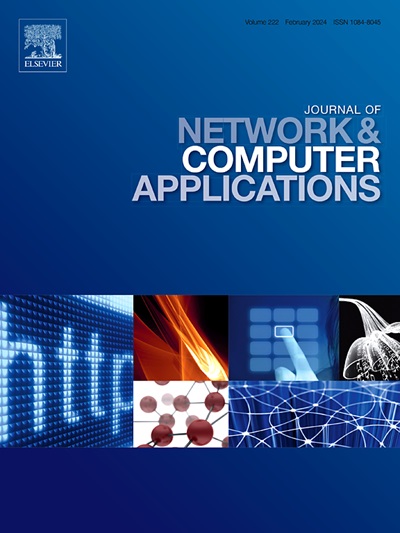A new segment routing with NEMO BSP based distributed mobility management approach in smart city network
IF 8
2区 计算机科学
Q1 COMPUTER SCIENCE, HARDWARE & ARCHITECTURE
引用次数: 0
Abstract
Due to high hop counts and complex inter-domain handover processing, the existing Distributed Mobility Management(DMM) framework in smart cities suffers from moderate delay and reliability issues during the handoff process in critical environments. These challenges hinder network efficiency, increasing latency, packet delivery costs, and reconfiguration requirements. In the present work, we proposed a novel Network Mobility Basic Support Protocol (NEMO BSP) with Segment Routing (SR) approach to enhance the network performance in distributed mobility management environments. The Segment Routing (SR) is integrated with existing network mobility methods to enhance performance. Also, we have proposed an algorithm NEMO-SR to reduce the hop count for data transmission. In previous research, the authors have reported various routing methods. However, the existing network mobility and routing methods mainly focus on the distributed mobility scheme of routers, which can improve performance to a certain extent. However, the segment routing-based distributed network mobility system can improve performance by optimizing the number of hop counts. SR enables optimized path selection and minimizes the overhead by reducing hop counts and reconfiguration needs. Thus, the proposed method can improve the key performance metrics such as Packet Delivery Cost (PDC), Latency, Tunnel Creation Rate (TCR), and Throughput. The proposed model introduces SR-specific tuning factors, which perform adaptive optimization and adjust the impact of SR on network metrics according to real-time conditions. This adaptive tuning is instrumental in high-mobility environments and data-intensive networks typical of 5G and Beyond 5G systems. SR minimizes signaling overhead and improves resource efficiency by effectively reducing the need for frequent tunnel reconfigurations. The performance of the proposed method is compared with the existing methods to analyze the performance. For the validation, both numerical analysis and simulation results were developed. The results prove that the proposed method supports mobility more efficiently, and the performance of the proposed method improves in terms of throughput, latency, PDC, and other parameters.

基于NEMO BSP的智慧城市网络分段路由分布式移动管理方法
由于高跳数和复杂的域间切换处理,现有的智慧城市分布式移动管理(DMM)框架在关键环境下的切换过程中存在中等延迟和可靠性问题。这些挑战阻碍了网络效率,增加了延迟、数据包传递成本和重新配置需求。在本工作中,我们提出了一种新的网络移动基本支持协议(NEMO BSP)与段路由(SR)方法,以提高分布式移动管理环境中的网络性能。SR (Segment Routing)与现有的网络移动方式相结合,提高了性能。此外,我们还提出了一种算法NEMO-SR来减少数据传输的跳数。在之前的研究中,作者已经报道了各种路由方法。然而,现有的网络移动和路由方法主要集中在路由器的分布式移动方案上,这种方案可以在一定程度上提高性能。而基于段路由的分布式网络移动系统可以通过优化跳数来提高性能。SR支持优化路径选择,并通过减少跳数和重新配置需求来最小化开销。因此,该方法可以提高关键性能指标,如分组交付成本(PDC)、延迟、隧道创建速率(TCR)和吞吐量。该模型引入特定于SR的调整因子,根据实时情况进行自适应优化,调整SR对网络指标的影响。这种自适应调优在5G和超5G系统的高移动性环境和数据密集型网络中非常有用。SR通过有效减少频繁隧道重新配置的需要,将信令开销最小化,提高资源效率。将所提方法的性能与现有方法进行了比较,分析了其性能。为了验证该方法的有效性,给出了数值分析和仿真结果。结果表明,该方法更有效地支持迁移,在吞吐量、延迟、PDC等参数方面均有提高。
本文章由计算机程序翻译,如有差异,请以英文原文为准。
求助全文
约1分钟内获得全文
求助全文
来源期刊

Journal of Network and Computer Applications
工程技术-计算机:跨学科应用
CiteScore
21.50
自引率
3.40%
发文量
142
审稿时长
37 days
期刊介绍:
The Journal of Network and Computer Applications welcomes research contributions, surveys, and notes in all areas relating to computer networks and applications thereof. Sample topics include new design techniques, interesting or novel applications, components or standards; computer networks with tools such as WWW; emerging standards for internet protocols; Wireless networks; Mobile Computing; emerging computing models such as cloud computing, grid computing; applications of networked systems for remote collaboration and telemedicine, etc. The journal is abstracted and indexed in Scopus, Engineering Index, Web of Science, Science Citation Index Expanded and INSPEC.
 求助内容:
求助内容: 应助结果提醒方式:
应助结果提醒方式:


